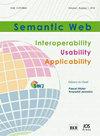A behaviouristic semantic approach to blockchain-based e-commerce
IF 3
3区 计算机科学
Q2 COMPUTER SCIENCE, ARTIFICIAL INTELLIGENCE
引用次数: 3
Abstract
Electronic commerce and finance are progressively supporting and including decentralized, shared and public ledgers such as the blockchain. This is reshaping traditional commercial activities by advancing them towards Decentralized Finance (DeFi) and Commerce 3.0, thereby supporting the latter’s potential to outpace the hurdles of central authority controllers and lawgivers. The quantity and entropy of the information that must be sought and managed to become active participants in such a relentlessly evolving scenario are increasing at a steady pace. For example, that information comprises asset or service description, general rules of the game, and specific technologies involved for decentralization. Moreover, the relevant information ought to be shared among innumerable and heterogeneous stakeholders, such as producers, buyers, digital identity providers, valuation services, and shipment services, to just name a few. A clear semantic representation of such a complex and multifaceted blockchain-based e-Commerce ecosystem would contribute dramatically to make it more usable, namely more automatically accessible to virtually anyone wanting to play the role of a stakeholder, thereby reducing programmers’ effort. However, we feel that reaching that goal still requires substantial effort in the tailoring of Semantic Web technologies, hence this article sets out on such a route and advances a stack of OWL 2 ontologies for the semantic description of decentralized e-commerce. The stack includes a number of relevant features, ranging from the applicable stakeholders through the supply chain of the offerings for an asset, up to the Ethereum blockchain, its tokens and smart contracts. Ontologies are defined by taking a behaviouristic approach to represent the various participants as agents in terms of their actions, inspired by the Theory of Agents and the related mentalistic notions. The stack is validated through appropriate metrics and SPARQL queries implementing suitable competency questions, then demonstrated through the representation of a real world use case, namely, the iExec marketplace.基于区块链的电子商务的行为语义方法
电子商务和金融正逐步支持并包括去中心化、共享和公共分类账,如区块链。这正在重塑传统的商业活动,将其推向去中心化金融(DeFi)和商业 3.0,从而支持后者超越中央权力控制者和法律制定者障碍的潜力。在这种不断发展的情况下,要成为积极的参与者,必须寻找和管理的信息的数量和熵都在稳步增加。例如,这些信息包括资产或服务说明、一般游戏规则以及去中心化所涉及的具体技术。此外,相关信息应在无数异构的利益相关者之间共享,如生产者、购买者、数字身份提供者、估价服务和运输服务等。对这样一个基于区块链的复杂而多面的电子商务生态系统进行清晰的语义表述,将大大有助于提高其可用性,即几乎任何想要扮演利益相关者角色的人都能更自动地访问该系统,从而减少程序员的工作量。然而,我们认为,要实现这一目标,仍需要在定制语义网技术方面付出大量努力,因此,本文开始了这样一条路线,并为去中心化电子商务的语义描述推进了OWL 2本体堆栈。该堆栈包括许多相关特征,从适用的利益相关者到资产产品的供应链,直至以太坊区块链、其代币和智能合约。受代理理论(Theory of Agents)和相关心智学概念的启发,本体的定义采用了行为学方法,将不同的参与者作为代理来表示他们的行为。通过适当的指标和 SPARQL 查询实现适当的能力问题,对堆栈进行验证,然后通过表示真实世界的使用案例(即 iExec 市场)进行演示。
本文章由计算机程序翻译,如有差异,请以英文原文为准。
求助全文
约1分钟内获得全文
求助全文
来源期刊

Semantic Web
COMPUTER SCIENCE, ARTIFICIAL INTELLIGENCEC-COMPUTER SCIENCE, INFORMATION SYSTEMS
CiteScore
8.30
自引率
6.70%
发文量
68
期刊介绍:
The journal Semantic Web – Interoperability, Usability, Applicability brings together researchers from various fields which share the vision and need for more effective and meaningful ways to share information across agents and services on the future internet and elsewhere. As such, Semantic Web technologies shall support the seamless integration of data, on-the-fly composition and interoperation of Web services, as well as more intuitive search engines. The semantics – or meaning – of information, however, cannot be defined without a context, which makes personalization, trust, and provenance core topics for Semantic Web research. New retrieval paradigms, user interfaces, and visualization techniques have to unleash the power of the Semantic Web and at the same time hide its complexity from the user. Based on this vision, the journal welcomes contributions ranging from theoretical and foundational research over methods and tools to descriptions of concrete ontologies and applications in all areas. We especially welcome papers which add a social, spatial, and temporal dimension to Semantic Web research, as well as application-oriented papers making use of formal semantics.
 求助内容:
求助内容: 应助结果提醒方式:
应助结果提醒方式:


